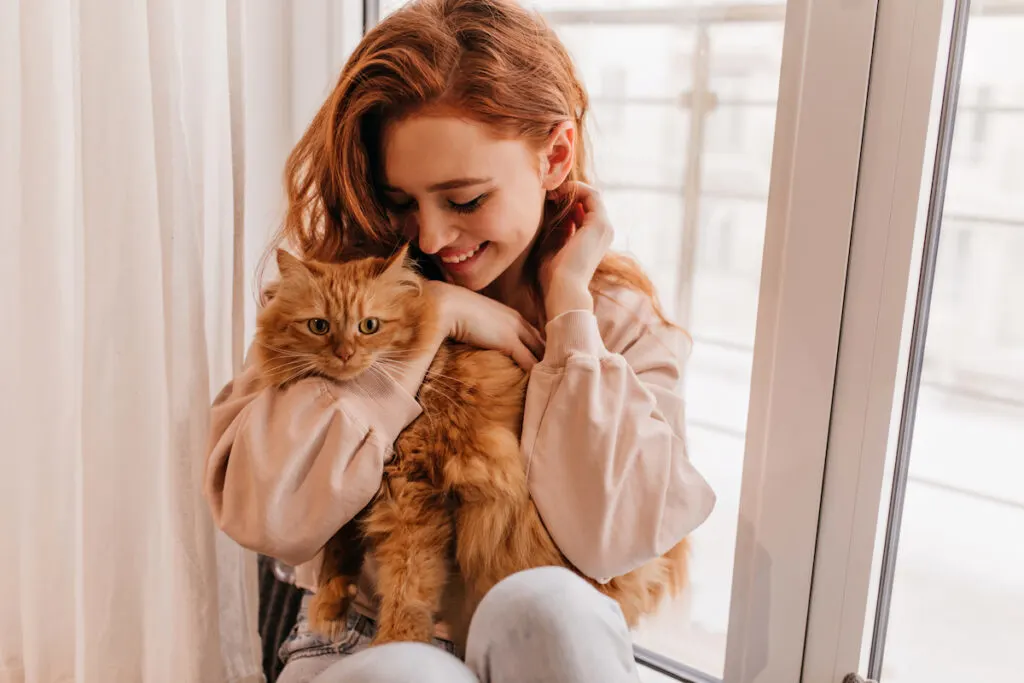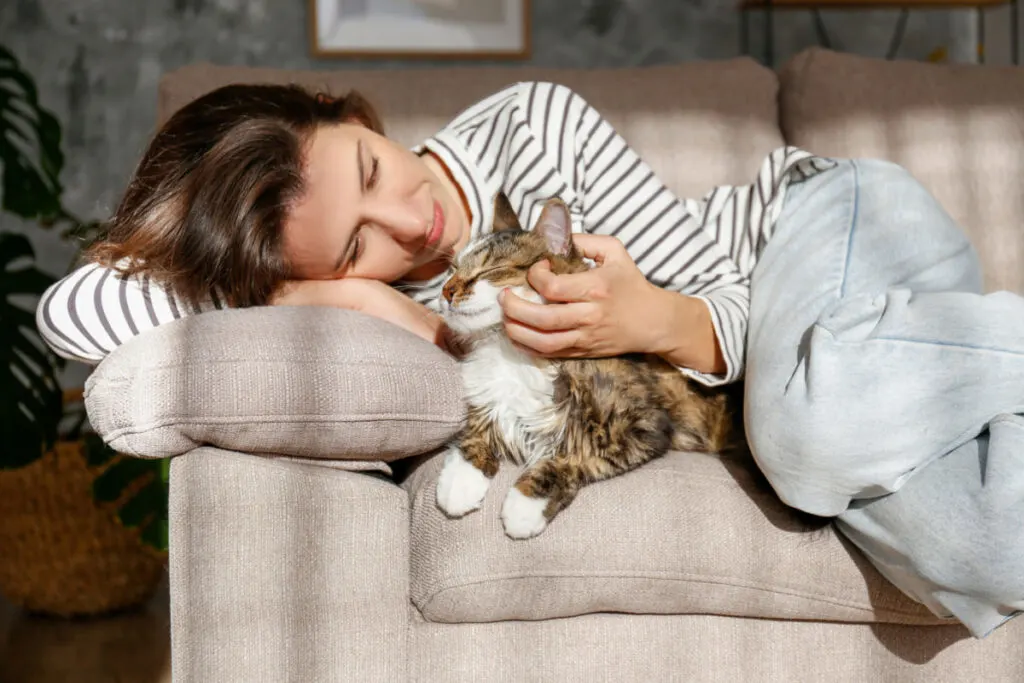For most people, having a feline inside their home is a good thing.
After all, we can’t deny the fact that cats do provide us with many benefits. While they may not be as affectionate as dogs, cats give us comfort – something that we sometimes really need after a long day at work.
When it comes to grooming, demands are pretty low. They love to groom themselves, and will actually do well without your help.
While they can make you feel better, do cats really sense your emotions? The answer is yes. But, how do they identify our emotions?
There are certain tactics cats use to know their owner’s emotions. One is through recognizing facial expressions, such as crying and smiling.

According to one study, cats are capable of recognizing and understanding their owner’s facial expression.
More so, the study showed that cats are more likely to react to positive behaviors. Let’s say your cat sees that you’re smiling, he tends to stay around you for a longer time than usual while purring and rubbing his body against yours.
However, this behavior only happens to people with whom cats create deep connections with.
It is believed that they don’t recognize the emotional state, or mood, of strangers, so they’re more likely to be aloof and reserved around them.
Another way your cat identifies your emotion is by listening to the tone of your voice.
In case you didn’t know, cats have especially sensitive ears.
For this reason, they’ll know when you are angry when they hear you raising your voice. Once they’ve learned about this, they tend to hide in a safe place instead of staying near you.
Aside from the tone of your voice, they’ll also identify your emotion by looking at your facial expression, which we mentioned earlier.
Cats will also depend on their emotions toward you during uncertain situations.
If you ever find you and your cat in a strange or risky situation, you may find your cat looking at you to see your reaction. If he sees you are stressed or scared, then it is more likely that he will respond in the same way.
This happens because a cat sees his owner as his parent. That is why he will gauge his response to an unfamiliar situation solely from your facial gesture, speech, and body language.
You may also want to observe your cat’s response when he sees you scared or panicking. During this situation, your cat may pay more attention to you because he recognizes from your body language that you need reassurance.
Cats aren’t actually just emotionless and territorial animals after all.
They do care for you, and will comfort you when they sense that you need them.
Table of Contents
Can they sense depression/anxiety?
In a recent study, it is believed that cats do know when we are feeling down, or depressed.
However, there is no evidence that they actually comfort us during these times.
As previously mentioned, cats respond more to positive behaviors because they associate it with good things, such as giving snacks and petting.
It is believed that this study may actually work well in the opposite situation.
Do they try to cheer you up?
Let me give you a realistic scenario. Let’s say you’re feeling blue. It is more likely that you’ll stay in your bed for a longer time than the usual.
During this time, your cat may look for a warm and comfortable place to sleep, which is beside you.
As with most owners, if not all, you tend to cuddle or pet your cat when they approach you in order to soothe and relax your mind.
Over time, your cat may get used to this situation, thus associating your sadness with more scratching and cuddling.
The same thing happens if you overeat when you’re down: More food for their owner, more crumbs for them to eat, therefore more time to spend with you.
There are many more ways that cats will actually make you feel better, even if they don’t know it.
When near their owners, cats release oxytocin, which is famously known as the “love hormone.”
This chemical allows cats to be more affectionate towards their owners, or even to other cats they identify as their friend.
So, while they spend time with you, they also tend to be more affectionate and show their love to you mainly because of the love hormone that is being produced by their brain.
Have you experienced a situation where your cat suddenly kneads its paws to your body while it purrs? It simply means that he sees you as his parent, and that he likes you a lot.
Just this act from your cat can make you feel better.
In addition, purring actually makes you calm down more easily. As a matter of fact, purring can help prevent certain health issues, including hypertension, which is why cats are known to be excellent de-stressors.
Cats are immensely observant animals. For this reason, they will easily identify your habits – even those that you’re not even aware of!
Having this characteristic makes them easily pick up situational clues that will identify when they are most likely to get comfort, snacks, or praises from you.
So, while there is no evidence that your cat is actually comforting you, their ability to recognize your mood and stick beside you at this time will be enough to make you feel better.

Can cats sense bad people?
As mentioned, cats are excellent at reading body languages and facial expressions.
Combine this with their characteristic as highly observant creatures, they will easily sense the energy of the person and the environment that surrounds them.
If they perceive something, or someone as a threat, their fight or flight response will naturally dominate.
So, while they cannot identify bad people per se, they have the capability of sensing a person’s energy, including those who are not fond of them.
Can cats sense fear?
Like other emotions, cats will also identify fear based on their human’s body language, tone of voice, and the scent of their body.
If you’re frightened or nervous about something, you tend to sweat.
Cats can actually smell these pheromones we are producing and may associate it with the current emotion we are expressing.
Can cats sense illnesses?
Similar to dogs, cats are also capable of detecting diseases and ailments.
Their uniquely strong sense of smell gives them the ability to sniff out chemical changes in a person’s body that are caused by ailments and diseases.
Along with this, cats can also identify sudden changes in their person’s mood, behavior, and daily routine which signals them that something is not right.
Can cats sense pregnancy?
According to animal behavior specialists, cats can identify if a person is pregnant even before they take a pregnancy test.
If you’re still wondering why, mostly it’s because of their ability to smell and detect body temperature changes in your body, as well as the changes in your behavior.
Most often, the cat will start purring and rubbing his body more to his owner if he senses that she is pregnant.
Let’s get to know more on how they can actually sense pregnancy:
First, a pregnant woman’s body chemistry changes. The changes in hormonal levels affect your personal scent, which a cat can easily sniff out.
Also, a pregnant woman’s body becomes warmer. During pregnancy, the blood flow in the body increases which results in a raised metabolism, and then to an increase in body temperature.
This increase in body temperature is what your cat can sense, and the warmer you are, the more time the cat will spend snuggling with you.
At times, they may also sit on a pregnant woman’s belly.
They are masters at reading body languages, so they’ll notice the different posture, behaviors, habits, and extensive changes that a pregnant woman’s body does.
Even the smallest changes, they will, for sure, notice it.

Can cats sense when you are mad at them?
According to a study, cats can sense at least two human expressions, namely smiling and frowning.
A study also suggests that cats behave differently when their owner is smiling, and when their owner is frowning. So, while they react more to positive reactions, they also identify frowns as a “bad thing.”
However, it is unclear to what extent they are aware of human emotions. People frown for various reasons, and there is no evidence that cats will recognize anger.
For cat owners, perhaps cats are one of the greatest creatures in the world because of the comfort they bring to our lives, especially at times where we are most vulnerable.
Because of this, we must take good care of our cats so they can stay with us for a long time.
If you find this article helpful, feel free to share it with your family and friends that you know are fond of cats!
References:
- https://www.emotionalpetsupport.com/2020/03/4-ways-your-cat-can-sense-your-emotions-and-provide-you-relief/
- http://www.bbc.com/earth/story/20151015-your-cat-can-pick-up-on-how-you-are-feeling
- https://blog.petwellbeing.com/blog/cats/behavior-management/can-your-cat-tell-when-youre-sad
- https://www.cattitudedaily.com/can-cats-sense-bad-people-as-well-as-good-ones/
- https://vetbag.com/can-cats-sense-fear-in-their-owners/
- https://www.bustle.com/p/5-creepy-things-pets-can-sense-from-natural-disasters-to-death-itself-13082672
- https://philadelphia.cbslocal.com/2013/11/19/dogs-and-cats-can-detect-illness/
- https://flo.health/getting-pregnant/trying-to-conceive/signs-of-pregnancy/can-cats-sense-pregnancy
- https://www.cuteness.com/13715715/can-cats-sense-our-emotions
- https://www.cuteness.com/13709276/do-dogs-cats-know-when-im-angry
